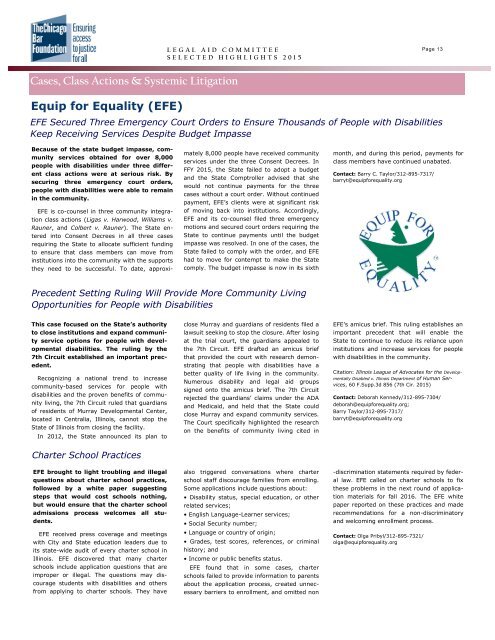Legal Aid Committee Selected Highlights 2015
1Stgu15
1Stgu15
You also want an ePaper? Increase the reach of your titles
YUMPU automatically turns print PDFs into web optimized ePapers that Google loves.
L E G A L A I D C O M M I T T E E<br />
S E L E C T E D H I G H L I G H T S 2 0 1 5<br />
Page 13<br />
Cases, C a s e Class s, C Actions l a s s & A Systemic c t i o n Litigation s & S y s t e m i c L i t i g a t i o n<br />
Equip for Equality (EFE)<br />
EFE Secured Three Emergency Court Orders to Ensure Thousands of People with Disabilities<br />
Keep Receiving Services Despite Budget Impasse<br />
Because of the state budget impasse, community<br />
services obtained for over 8,000<br />
people with disabilities under three different<br />
class actions were at serious risk. By<br />
securing three emergency court orders,<br />
people with disabilities were able to remain<br />
in the community.<br />
EFE is co-counsel in three community integration<br />
class actions (Ligas v. Harwood, Williams v.<br />
Rauner, and Colbert v. Rauner). The State entered<br />
into Consent Decrees in all three cases<br />
requiring the State to allocate sufficient funding<br />
to ensure that class members can move from<br />
institutions into the community with the supports<br />
they need to be successful. To date, approxi-<br />
mately 8,000 people have received community<br />
services under the three Consent Decrees. In<br />
FFY <strong>2015</strong>, the State failed to adopt a budget<br />
and the State Comptroller advised that she<br />
would not continue payments for the three<br />
cases without a court order. Without continued<br />
payment, EFE’s clients were at significant risk<br />
of moving back into institutions. Accordingly,<br />
EFE and its co-counsel filed three emergency<br />
motions and secured court orders requiring the<br />
State to continue payments until the budget<br />
impasse was resolved. In one of the cases, the<br />
State failed to comply with the order, and EFE<br />
had to move for contempt to make the State<br />
comply. The budget impasse is now in its sixth<br />
month, and during this period, payments for<br />
class members have continued unabated.<br />
Contact: Barry C. Taylor/312-895-7317/<br />
barryt@equipforequality.org<br />
Precedent Setting Ruling Will Provide More Community Living<br />
Opportunities for People with Disabilities<br />
This case focused on the State’s authority<br />
to close institutions and expand community<br />
service options for people with developmental<br />
disabilities. The ruling by the<br />
7th Circuit established an important precedent.<br />
Recognizing a national trend to increase<br />
community-based services for people with<br />
disabilities and the proven benefits of community<br />
living, the 7th Circuit ruled that guardians<br />
of residents of Murray Developmental Center,<br />
located in Centralia, Illinois, cannot stop the<br />
State of Illinois from closing the facility.<br />
In 2012, the State announced its plan to<br />
close Murray and guardians of residents filed a<br />
lawsuit seeking to stop the closure. After losing<br />
at the trial court, the guardians appealed to<br />
the 7th Circuit. EFE drafted an amicus brief<br />
that provided the court with research demonstrating<br />
that people with disabilities have a<br />
better quality of life living in the community.<br />
Numerous disability and legal aid groups<br />
signed onto the amicus brief. The 7th Circuit<br />
rejected the guardians’ claims under the ADA<br />
and Medicaid, and held that the State could<br />
close Murray and expand community services.<br />
The Court specifically highlighted the research<br />
on the benefits of community living cited in<br />
EFE’s amicus brief. This ruling establishes an<br />
important precedent that will enable the<br />
State to continue to reduce its reliance upon<br />
institutions and increase services for people<br />
with disabilities in the community.<br />
Citation: Illinois League of Advocates for the Developmentally<br />
Disabled v. Illinois Department of Human Services,<br />
60 F.Supp.3d 856 (7th Cir. <strong>2015</strong>)<br />
Contact: Deborah Kennedy/312-895-7304/<br />
deborah@equipforequality.org;<br />
Barry Taylor/312-895-7317/<br />
barryt@equipforequality.org<br />
Charter School Practices<br />
EFE brought to light troubling and illegal<br />
questions about charter school practices,<br />
followed by a white paper suggesting<br />
steps that would cost schools nothing,<br />
but would ensure that the charter school<br />
admissions process welcomes all students.<br />
EFE received press coverage and meetings<br />
with City and State education leaders due to<br />
its state-wide audit of every charter school in<br />
Illinois. EFE discovered that many charter<br />
schools include application questions that are<br />
improper or illegal. The questions may discourage<br />
students with disabilities and others<br />
from applying to charter schools. They have<br />
also triggered conversations where charter<br />
school staff discourage families from enrolling.<br />
Some applications include questions about:<br />
• Disability status, special education, or other<br />
related services;<br />
• English Language-Learner services;<br />
• Social Security number;<br />
• Language or country of origin;<br />
• Grades, test scores, references, or criminal<br />
history; and<br />
• Income or public benefits status.<br />
EFE found that in some cases, charter<br />
schools failed to provide information to parents<br />
about the application process, created unnecessary<br />
barriers to enrollment, and omitted non<br />
-discrimination statements required by federal<br />
law. EFE called on charter schools to fix<br />
these problems in the next round of application<br />
materials for fall 2016. The EFE white<br />
paper reported on these practices and made<br />
recommendations for a non-discriminatory<br />
and welcoming enrollment process.<br />
Contact: Olga Pribyl/312-895-7321/<br />
olga@equipforequality.org


